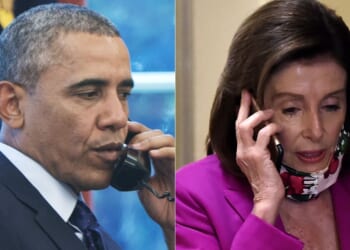The big news from Labour land is that Lucy Powell has been elected as the party’s new deputy leader. On Saturday, she beat education minister Bridget Phillipson, prime minister Keir Starmer’s pick for the job, winning 54 per cent of the vote to Phillipson’s 46 per cent. Given that only 16 per cent of Labour’s members bothered to cast a ballot at all, it is tempting to suggest that the real winner here, on 84 per cent, was Couldn’t Give A Toss.
Still, this was certainly another blow for Starmer, so soon after Labour’s historic implosion in the Caerphilly by-election in South Wales last week. Sacked from the cabinet in September, Powell is widely viewed by Starmer’s left-wing critics as a spend-and-tax, ‘soft-left’ corrective to the supposedly ‘right-wing’, ‘Reform-lite’ turn of the PM. Indeed, Labour’s media cheerleaders now seem to think that she might help revive Labour’s fortunes. Or as one put this weekend, she could be ‘a punchy advocate of the party’s values and achievements, and the facilitator of a constructively critical conversation about where it is going wrong’.
This is, let’s face it, delusional. If Lucy Powell is the answer, then one can only assume Ed Miliband, the great green lord of the so-called soft left, has written the question. Far from being Labour’s saviour, Powell embodies all that is wrong with Britain’s governing party. She ticks all the boxes of its modern leadership cadre – achingly middle-class background, a stint at the University of Oxford and King’s College London, followed by a seamless progression through Labour HQ’s professional ranks. It is a trajectory that ensures so many of today’s politicians live in a completely different world to those they claim to represent.
Powell’s political views, saturated with every elitist, ‘progressive’ sentiment going, reflect this estrangement. She’s relentlessly pro-EU and anti-Brexit. She supports impoverishing Net Zero policies. And she continues to ride the trans-activist bandwagon, even in the wake of the UK Supreme Court ruling on the definition of sex. Indeed, just last month, she suggested that the Equality and Human Rights Commission (EHRC) guidance protecting single-sex spaces was ‘not right’ and should be reviewed by MPs.
Above all, it’s her dismissive attitude to the grooming-gangs scandal that really exposes her alienation from vast swathes of the UK. Back in May, she appeared on the BBC’s Any Questions, where Reform-supporting commentator Tim Montgomerie asked her if she had seen a recently aired Channel 4 documentary on the rape gangs. Powell sneered in response: ‘Oh, so we want to blow that little trumpet now, do we? Yeah, let’s get that dogwhistle out.’
That’s how Powell chose to refer to the country-wide rape and torture of thousands of young white, working-class girls at the hands of men from largely Pakistani-heritage backgrounds – that is, as no more than right-wing propaganda. A ‘little trumpet’, a ‘dogwhistle’ sent out to a canine-like public. She later apologised for her response, but this rang more than a little hollow.
Of course, she is far from alone among Labourites in her disdainful attitude to the grooming-gangs scandal – and for anyone who might be outraged by it. Starmer himself once dismissed calls for a national inquiry as a ‘far-right bandwagon’. Yet Powell is noteworthy for persevering in this view, having still sneeringly dismissed the scandal only a few months ago. That she of all Labour MPs has now been elected as the deputy party leader, at the very moment the government’s grooming-gangs inquiry is falling apart, is just another kick in the guts to the thousands of victims of this scandal.
The problem with Powell, as with too many among our political class, is that she still cleaves to the ideology of multiculturalism. She seems to think that protecting certain groups from offence, in the name of preserving social cohesion, is more important than reckoning with real problems. This was clear from another incident from her political past. As Tom Slater recently reminded us, Powell appeared on the BBC’s Daily Politics show just after the Manchester Arena bombing in 2017, when jihadist Salman Abedi blew himself up, killing 22 people, many of them young girls. Presenter Andrew Neil asked her how serious the problem of ‘Islamist radicalisation’ is in Manchester. She seemed more outraged by the question than the terrorist attack itself. She then proceeded to reprimand Neil. ‘I don’t even want to ascribe what has happened to the Islam faith’, she retorted.
It was a response that revealed two things. Firstly, her ignorance of the distinction between the faith of Islam and the often violent politics of Islamism. Secondly, and more importantly, it showed that she was more concerned with policing language for potential offence, than she was with the all too lethal threat posed by Islamist terrorism. Just as with the grooming-gangs scandal, Powell would prefer we look the other way. That we move along. Nothing to see here.
After her victory this weekend, Powell told the BBC’s Political Thinking podcast that: ‘Some of the mistakes that [Labour has] made, or some of the unforced errors, have given a sense that we’re not on the side of ordinary people.’ She is more right than she realises.
Tim Black is associate editor of spiked.

















